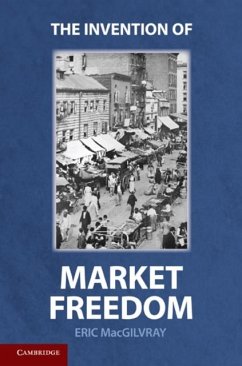How did the value of freedom become so closely associated with the institution of the market? Why did the idea of market freedom hold so little appeal before the modern period and how can we explain its rise to dominance? In The Invention of Market Freedom, Eric MacGilvray addresses these questions by contrasting the market conception of freedom with the republican view that it displaced. After analyzing the ethical core and exploring the conceptual complexity of republican freedom, MacGilvray shows how this way of thinking was confronted with, altered in response to, and finally overcome by the rise of modern market societies. By learning to see market freedom as something that was invented, we can become more alert to the ways in which the appeal to freedom shapes and distorts our thinking about politics.
Dieser Download kann aus rechtlichen Gründen nur mit Rechnungsadresse in A, B, BG, CY, CZ, D, DK, EW, E, FIN, F, GR, HR, H, IRL, I, LT, L, LR, M, NL, PL, P, R, S, SLO, SK ausgeliefert werden.









